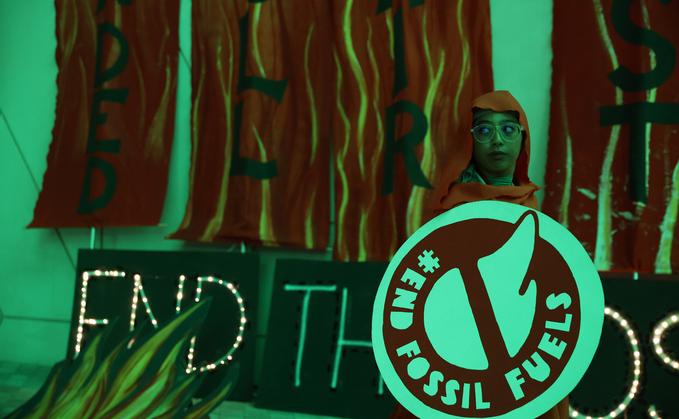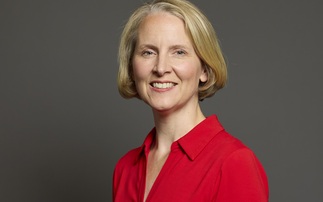
Credit: COP28
The attempt to brand the UAE Consensus as a success or failure misses the point - its impact depends on what governments and businesses do next
Like Wile E. Coyote, but without the madcap comic charm, the global fossil fuel industry finds itself out beyond the cliff edge - it just hasn't realised yet.
Clean energy generation is close to outstripping increases in energy demand. This means global emissions will peak within the next few years and begin to fall. The fast-expanding pipeline of renewables projects and surging demand for electric vehicles will then destroy demand for coal, oil, and gas far faster than the industry realises. Attempts to prop up fossil fuel production through the deployment of carbon capture and removal projects will make a difference at the margins, but will struggle to overcome the eye-watering cost of such technologies. As fossil fuel demand falls and regulatory regimes tighten, capital costs will rise, financial returns will shrink, and investors will rush to support the clean industries of the 21st century. Deep down almost everyone knows this - even the world's petrostates. The only question is when will gravity assert itself.
This is the context in which COP28's historic UAE Consensus has to be seen. The reductive debates over whether the deal constitutes a success or failure - it is self-evidently both these things - ignores the limitations of international negotiations and what they are actually trying to achieve. As the UN's climate chief, Simon Stiell, reminded diplomats in Dubai this morning as they cheered the agreement of a genuinely historic deal, what has been agreed today will not reduce emissions in and of itself. It will only work if governments and businesses "turn these pledges into real economy outcomes without delay".
COP Summits can deliver legal frameworks, climate targets, and admirable rhetoric, but their success or failure can only be measured years after the event when it becomes clear if the signals provided to governments and investors have cut through or not. In an ideal world, the process would deliver stronger legal guarantees that agreements will trigger promised emissions reductions. But breaking with the current consensus-based and essentially voluntary approach would risk blowing up the international order at a time when its foundations are already crumbling.
Meanwhile, there is evidence the current imperfect approach is delivering progress. A decade ago in the run up to the Paris Agreement the world was on track for around 4C of warming this century. Now it is down to 3C and there are hopes the 2C goal could be met if governments deliver on their net zero promises. It is insufficient and climate disaster still looms, but it is not nothing.
The UAE Consensus builds on this progress and could yet mark an historic turning point akin to that historic night in the French capital eight years ago, depending on the signals governments and investors choose to take from Dubai.
The need to secure an agreement by consensus has resulted in a text that is defined above all else by its 'constructive ambiguity'. As a result, two competing narratives have been advanced.
The first narrative is the one the petrostates and their allies signed up to. It is based on a text littered with loopholes, which calls for rather than demands climate action, limits the transition away from fossil fuels to narrowly defined energy systems, allows for the widespread use of carbon capture and removals to justify continued investment in fossil fuel production, and tacitly backs new fossil gas projects as long as they are branded as 'transitional fuels'.
The second narrative is the one advanced by the more than 120 countries that wanted to see a 'phase out of unabated fossil fuels': the transition away from fossil fuels is now inevitable and needs to start this decade so as to deliver net zero emissions by 2050, the roll out of clean technologies will continue to accelerate, and nature protection will be strengthened.
It is this narrative that has the momentum behind it, provided by surging levels of global clean tech investment and growing public awareness of catastrophic climate impacts. The new goals to treble renewables capacity and double the rate of energy efficiency improvement promise to catalyse billions of dollars of investment and obliterate megatonnes of fossil fuel demand. Two years ago at the COP26 Summit in Glasgow, governments could only agree to 'phase down' unabated coal power, and that was rightly seen as a significant breakthrough. Now they publicly accept the need for a transition away from all fossil fuels. Countries that were adamant they would never sign off on such a proposal have backed down. Maybe their arms were twisted; maybe they recognised that this is not a battle they can ever accept to win. The coming years are likely to see all the goals and pledges made in the UAE strengthened further.
The question as to which narrative will now win out depends on what happens next.
Small island states and climate vulnerable nations were right to complain this morning that the UAE Consensus has established a new goal without the means to deliver it. Unless much more is done to provide developing and emerging economies with access to affordable climate finance they will never be able to cover the upfront cost of the clean technologies that will enable the transition away from fossil fuels. If the world is really serious about transitioning away from fossil fuels, then it should adopt Barbados Prime Minister Mia Mottley's Bridgetown Agenda reforms to the global financial system with immediate effect.
Equally, industrialised nations such as the US and UK cannot expect emerging economies to embrace the need to transition away from fossil fuels while approving new drilling projects and underinvesting in clean technologies and carbon capture projects. The next wave of national climate action plans - or Nationally Determined Contributions (NDCs) in the UN jargon - need to reflect what was agreed in Dubai, which means credible plans to wind down fossil fuel production and deliver on net zero goals.
Those governments committed to a 'high ambition' response to the climate crisis also need to recognise the success they enjoyed at COP28 by driving a hard bargain. The need to now deliver on the pledges made in the UAE justifies a more robust approach to climate diplomacy, including the use of Carbon Border Adjustment Mechanism (CBAM) tariffs on imports from countries that refuse to take credible steps to transition away from fossil fuels.
All these measures will face fierce resistance from those governments and oil and gas firms that continue to claim that expanded fossil fuel production is somehow compatible with deep decarbonisation. The risk of a climate sceptic, populist backlash led by a re-elected President Trump remains ever present. As does the risk of escalation in the many horrific conflicts that threaten to torch the multilateralism that lies at the heart of the UN climate talks.
The breakthrough in Dubai has come too late and may not even deliver on its considerable promise. The past year has been the hottest on record and the 1.5C threshold could be breached in short order. Flows of climate-induced migration have barely begun, and they are already unleashing inhuman and authoritarian impulses. As ever, the past few weeks should have seen much more focus on the need to ramp up investment in climate adaptation and resilience. Meanwhile, it remains far too easy for bad faith actors to ignore the climate pledges they promised to deliver, first in Paris, then in Glasgow, and now in Dubai.
It is also critical to remember the scale of the challenge. The sprawling gas and desalination plants just down the road from COP28's Expo City venue provided daily evidence of how difficult it will be to wind down the fossil fuel economy inside three decades. The most daunting and most exciting engineering challenge in human history awaits.
But despite all these threats, the arguments in support of continued fossil fuel expansionism are now stretching credulity to breaking point. The fact the call to transition away from fossil fuels was signed, sealed, and delivered in a petrostate shows that no one really believes it anymore. Even if every loophole contained in today's agreement is expoited fossil fuel demand is still going to fall sharply as the industry is outcompeted by lower cost clean technologies. Oil, gas, and coal investments are at risk of becoming stranded assets. The need for fossil fuel economy diversification is increasingly taken as read.
Businesses and investors need to ask themselves, which narrative is most compelling? Is the global economy going to go on poisoning itself, while watching climate impacts spiral out of control? Or is the international community going to do as it has said it will do and rapidly build on the booming clean energy revolution that is already underway, developing innovative new sustainable business models along the way that improve lives and livelihoods for all? Which of these is the lower risk pathway from both an investment and a survival of humanity point of view?
What the UAE Consensus has done is shift that equation ever more clearly in favour of the second scenario and the inevitability of a net zero transition, which may not happen fast enough but is objectively well underway. And in doing so it has forced everyone to publicly recognise that the fossil fuel industry is heading for a fall.










